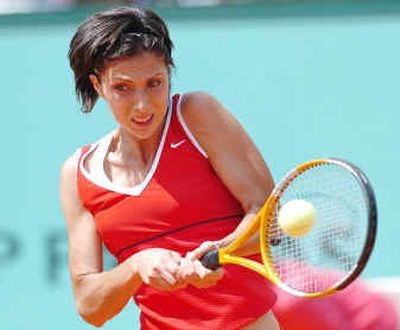Myskina keeps her cool

PARIS — Anastasia Myskina knows how it feels to fight herself more than her opponent. She knows how it feels to get so frustrated that the urge rises to toss a racket or scream or even just give up.
And now, in part because Elena Dementieva struggled with such thoughts in the French Open final, Myskina knows how it feels to be a Grand Slam champion.
Myskina beat her countrywoman and friend 6-1, 6-2 Saturday at Roland Garros with solid play, steady resolve — and plenty of help from Dementieva’s 33 unforced errors, including 10 double-faults.
“I was really emotional. I was really nervous, as well,” Myskina said. “And I think, um, Elena was nervous more.”
In keeping with the surprising nature of the past two weeks, the sixth-seeded Myskina became the first Russian woman to win a major title. And she did so at a tournament where she had never been past the second round, going 1-4.
Myskina earned her silver trophy and $1.02 million check. She changed pace and whipped the occasional winner against Dementieva the way she did in victories over Venus Williams and Jennifer Capriati. Myskina, who will jump to a career-high No. 3 in the rankings, shed tears of tension in the locker room Saturday, then went out on court and won nine of the 14 rallies that lasted 10 strokes or more.
She attributes her breakthrough to maturation, a newfound ability to keep her composure.
During a match at the Australian Open, she threw her racket and gestured toward her coach, Jens Gerlach, complaining that he wasn’t supporting her vocally enough. Myskina tossed rackets in Paris, too, including while trailing in the fourth round against Svetlana Kuznetsova. (Myskina’s the first woman since Margaret Smith-Court in 1962 to win the French Open after saving a match point.)
The 10 previous Slams featured six all-Williams finals and three all-Belgian finals, with plenty of ragged play, but nothing of Saturday’s level. The first all-Russian championship match at a major was the most lopsided final at the French Open in 16 years, at any Slam in 10 years.
Maybe it was because Myskina and Dementieva met when they were 6 or 7 and taking lessons from the mother of 2000 U.S. Open champion Marat Safin at a Moscow club. Now 22, they’re pals, and they know each other’s weaknesses on court.
Myskina first pro title came in 1997 at a minor league event in Batumi, Georgia, when she was ranked 762nd. Her opponent in the final? Another Russian teen: 514th-ranked Elena Dementieva. All these years later, they combined for 15 double-faults, 11 break points, 50 unforced errors and 23 winners.
Perhaps the play reflected a lack of experience: It was the first time since the 1981 French Open that both participants were making major final debuts.
The last Russian woman in a major final was Olga Morozova, who lost to Chris Evert in the 1974 French Open and Wimbledon finals.